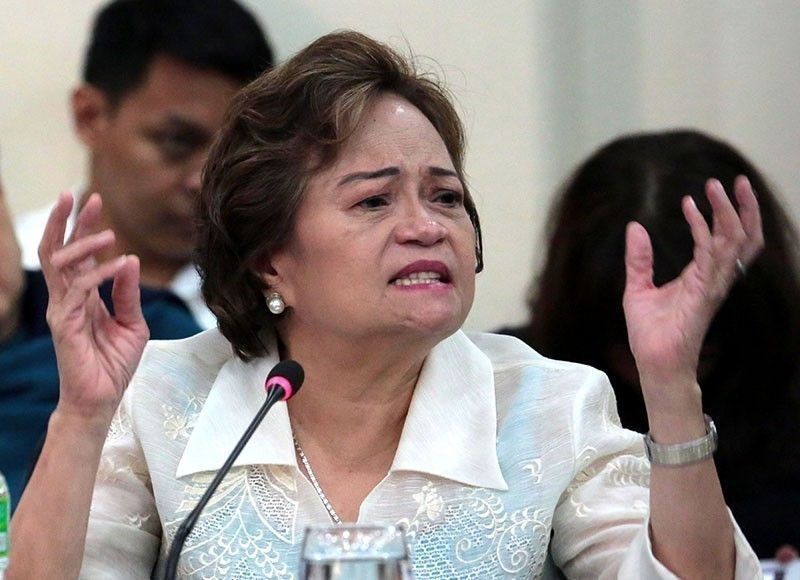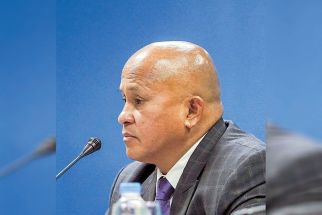Teresita de Castro won’t use Sereno’s service vehicle

MANILA, Philippines — Newly appointed Chief Justice Teresita Leonardo-de Castro will not use the controversial P5-million luxury service vehicle of her ousted predecessor that has remained impounded at the Supreme Court (SC) since June.
De Castro, who will take her oath of office and formally assume the top judicial post today, also bared that the SC plans to dispose of the Toyota Land Cruiser used by ousted chief justice Ma. Lourdes Sereno that was flagged by the Commission on Audit (COA).
She revealed the same plan for three big motorbikes previously purchased for Sereno’s security escorts.
“I will definitely not use the Land Cruiser and I will have no need for the three big motorbikes for security escorts,” De Castro told The STAR yesterday.
“The Court may decide to dispose or sell these properties subject to existing rules and regulations,” she added.
Sereno returned the Toyota Land Cruiser after the high court made final last June 19 its ruling ousting her from the chief justice post by granting the quo warranto petition filed by the Solicitor General.
It was one of the grounds raised in the earlier impeachment complaint against Sereno before the House of Representatives, which did not proceed due to her ouster via quo warranto case in the SC.
The COA had sent the SC an Audit Observation Memorandum (AOM) last June 1, which questioned the lack of bidding conducted and late submission of documents for the procurement of the luxury vehicle.
The COA said the purchase of the Toyota Land Cruiser, which was worth P5,110,500, was a violation of Republic Act 9184 (Government Procurement Act) and its Internal Rules and Regulations because only Toyota Makati joined the public bidding for the procurement of the vehicle.
Senior Associate Justice Antonio Carpio has directed the Court’s Procurement Planning Committee (PPC) and Bids and Awards Committee (BAC) to comment on the COA report.
Apart from her luxury vehicle, Sereno’s hiring of an information technology (IT) consultant for her office was likewise raised in the impeachment case for alleged anomaly.
The STAR reported in November 2017 that fact-finding report submitted to the SC has recommended that the contract amounting to about P10 million for the services of IT consultant Helen Perez-Macasaet be voided for “lapses in the procurement process.”
It stated that the contract violated existing laws and COA rules because it did not undergo public bidding.
The report was made pursuant to an order of the SC to investigate the matter in an earlier administrative order.
The contract, which covered six periods of six months each from October 2013 to June 2016, involved the services of Macasaet “to provide technical and policy advice to the Office of the Chief Justice and the Management Information Systems Office of the Supreme Court regarding implementation of EISP (Enterprise Information Systems Plan) and related ICT (information communication technology) projects.”
De Castro, who was picked by President Duterte from the shortlist submitted by the Judicial and Bar Council last Friday, vowed more transparency in procurement of properties in the judiciary.
The new chief justice likewise sees the media as a partner in instituting reforms in the judiciary, an apparent turnaround from the “dignfied silence” policy of Sereno that limited media’s access to information in the high court as an external communications strategy.
“The media is an important pillar of the justice system because of your strong influence on public opinion, particularly the public’s perception as to the effectiveness and integrity of the judiciary,” De Castro said.
“Your support is crucial to our success as one of the three great branches of the government,” she added.
De Castro earlier vowed to institute additional key reforms in the judiciary despite her limited tenure as chief justice, which would last for less than two months, as she is set to retire on Oct. 8.
She explained that administrative measures would not be difficult for her because she is certain to have the support of her colleagues in the high court.
Even prior to her promotion as chief justice, De Castro – who has been in civil service for 45 years – has led the SC in various judicial reform programs.
She was instrumental to the organization of statutory family courts under Republic Act 8369 in 1997. It took her leadership for the Court to implement the law and appoint the first of four batches of statutory family courts last year.
De Castro also spearheaded various resolutions of the committee on family courts and juvenile concerns involving jurisdiction of family courts, adoption procedures and treatment of children in conflict with the law.
The new chief justice also led the SC’s project on gender survey decisions – a first in the world – that was implemented on Court of Appeals decisions last April and will be rolled out in appellate and trial courts as well.
Lastly, De Castro also led training programs under her committees in SC – on gender responsiveness in the judiciary and on family courts and juvenile concerns – implemented by the Philippine Judicial Academy.
- Latest
- Trending
































